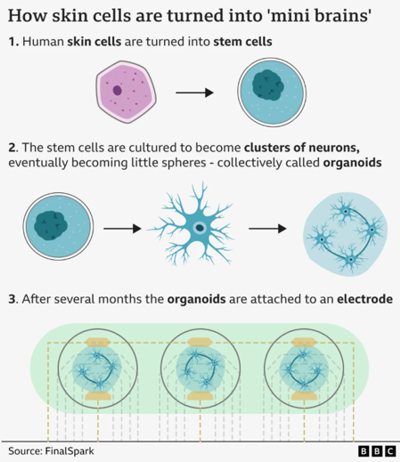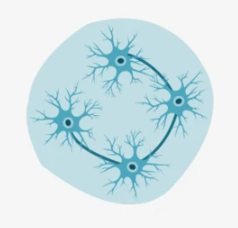| Organoids - Towards Energy Efficient Computing? |
| Written by Mike James | |||
| Sunday, 05 October 2025 | |||
|
The BBC has reported on the advances made by scientists in Switzerland in the emerging field of Organoid Intelligence which uses human stem cells to build "mini-brains", aka organiods. A major problem with the neural networks currently being used for artificial intelligence is their power consumption. Training a large AI model on traditional hardware can use millions of watts of electricity. The human brain by contrast operates on just 20 watts. Starting with human skin cells, FinalSpark, a company based in Switzerland, is growing tiny, lab-developed clusters of human brain cells referred to as "organoids". After months of cultivation, the organoids are connected to electrodes which allow electrical signals to be sent to and received effectively turning the cells into a component of a computing system. They are prompted to respond to simple commands, with the resulting electrical activity tracked on a computer. The problem encounterd by such biological computers is keeping the organoids alive. Using a microfluidics system that supplies both water and nutrients, FinalSpark has managed to sustain them for up to around four months. The long-term goal is to train these organoids to learn and eventually perform complex tasks, leveraging their efficiency for next-generation AI systems. While FinalSpark is making an important contribution towards a biological brain capable of General Artificial Intelligence, it isn't alone, nor is the endeavour new. Back in January 2022 we reported on DishBrain, a biological neural network (BNN), that learned to play Pong in a simulated game world. Among the Related Articles in that report was Google Has A Network More Like the Brain, an item from 2019 which looked at Project Ihmehimmeli being undertaken by Google Research in Zurich. Here's a really deep question - if a organoid achieves general intelligence is it artificial general intelligence?
More InformationScientists grow mini human brains to power computers Related ArticlesBrain In A Dish Learns To Play Pong Neurons Are Smarter Than We Thought Neurons Are Two-Layer Networks Google Has A Network More Like The Brain To be informed about new articles on I Programmer, sign up for our weekly newsletter, subscribe to the RSS feed and follow us on Facebook or Linkedin.
Comments
or email your comment to: comments@i-programmer.info |
|||
| Last Updated ( Sunday, 05 October 2025 ) |



